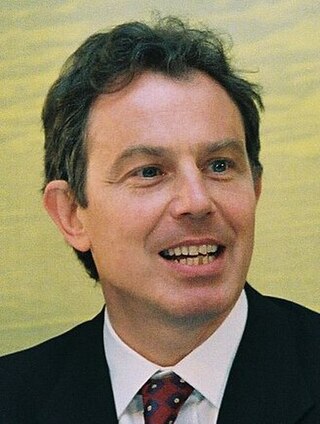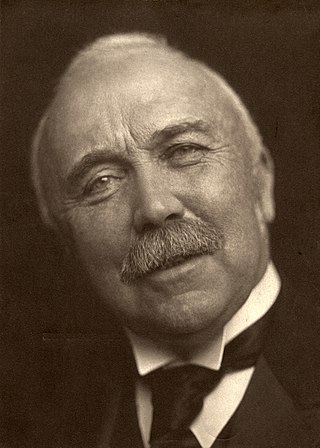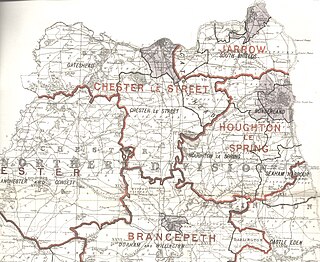
The 1997 United Kingdom general election was held on Thursday, 1 May 1997. The governing Conservative Party led by Prime Minister John Major was defeated in a landslide by the opposition Labour Party led by Tony Blair, achieving a 179-seat majority and a total of 419 seats.

The Independent Labour Party (ILP) was a British political party of the left, established in 1893 at a conference in Bradford, after local and national dissatisfaction with the Liberals' apparent reluctance to endorse working-class candidates. A sitting independent MP and prominent union organiser, Keir Hardie, became its first chairman.

The 2003 Scottish Parliament election was the second election of members to the Scottish Parliament. It was held on 1 May 2003 and it brought no change in terms of control of the Scottish Executive. Jack McConnell, the Labour Party MSP, remained in office as First Minister for a second term and the Executive continued as a Labour and Liberal Democrat coalition. As of 2023, it remains the last Scottish Parliament election victory for the Scottish Labour Party, and the last time the Scottish National Party lost a Holyrood election.

The 1918 United Kingdom general election was called immediately after the Armistice with Germany which ended the First World War, and was held on Saturday, 14 December 1918. The governing coalition, under Prime Minister David Lloyd George, sent letters of endorsement to candidates who supported the coalition government. These were nicknamed "Coalition Coupons", and led to the election being known as the "coupon election". The result was a massive landslide in favour of the coalition, comprising primarily the Conservatives and Coalition Liberals, with massive losses for Liberals who were not endorsed. Nearly all the Liberal MPs without coupons were defeated, including party leader H. H. Asquith.

The 1906 United Kingdom general election was held from 12 January to 8 February 1906. The Liberals, led by Prime Minister Henry Campbell-Bannerman, won a landslide majority at the election. The Conservatives led by Arthur Balfour, who had been in government until the month before the election, lost more than half their seats, including party leader Balfour's own seat in Manchester East, leaving the party with its fewest recorded seats ever in history until 2024. The election saw a 5.4% swing from the Conservative Party to the Liberal Party, the largest-ever seen at the time. This has resulted in the 1906 general election being dubbed the "Liberal landslide", and is now ranked alongside the 1924, 1931, 1945, 1983, 1997, 2001, and 2024 general elections as one of the largest landslide election victories.

The National Union of Women Suffrage Societies (NUWSS), also known as the suffragists was an organisation founded in 1897 of women's suffrage societies around the United Kingdom. In 1919 it was renamed the National Union of Societies for Equal Citizenship.
The Scottish United Trades Councils Labour Party, also known as the Scottish Trades Councils Independent Labour Party, was a Scottish labour party.

The 2011 Scottish Parliament election was held on Thursday, 5 May 2011 to elect 129 members to the Scottish Parliament.
The 1920 Paisley by-election was a parliamentary by-election held on 12 February 1920 for the UK House of Commons constituency of Paisley in Scotland. It was caused by the death of the constituency's sitting Liberal Member of Parliament Sir John Mills McCallum. Former Prime Minister H. H. Asquith, who was still leader of the Liberal Party but who had lost his seat at the 1918 general election, returned to the Commons.
The 1954 Inverness by-election was a by-election held on 21 December 1954 for the British House of Commons constituency of Inverness.
There are five types of elections in the United Kingdom: elections to the House of Commons of the United Kingdom, elections to devolved parliaments and assemblies, local elections, mayoral elections, and Police and Crime Commissioner elections. Within each of those categories, there may also be by-elections. Elections are held on Election Day, which is conventionally a Thursday, and under the provisions of the Dissolution and Calling of Parliament Act 2022 the timing of general elections can be held at the discretion of the prime minister during any five-year period. All other types of elections are held after fixed periods, though early elections to the devolved assemblies and parliaments can occur in certain situations. The five electoral systems used are: the single member plurality system (first-past-the-post), the multi-member plurality, the single transferable vote, the additional member system, and the supplementary vote.
The 1908 Leeds South by-election was a parliamentary by-election for the British House of Commons constituency of Leeds South in the West Riding of Yorkshire held on 13 February 1908.

The 1914 North West Durham by-election was a Parliamentary by-election held on 30 January 1914. It returned one Member of Parliament (MP) to the House of Commons of the United Kingdom, elected by the first past the post voting system.
The 1917 Aberdeen South by-election was a parliamentary by-election for the British House of Commons constituency of Aberdeen South comprising the local government wards in the southern part of the city of Aberdeen. The by-election took place on 3 April 1917.
The 1906 Huddersfield by-election was a Parliamentary by-election held on 28 November 1906. The constituency returned one Member of Parliament (MP) to the House of Commons of the United Kingdom, elected by the first past the post voting system.

Helen Miller Fraser, later Moyes, was a Scottish suffragist, feminist, educationalist and Liberal Party politician who later emigrated to Australia.

Mary Pollock Grant, also known as Marion Pollock, was a Scottish suffragette, Liberal Party politician, missionary and policewoman.

The Glasgow and West of Scotland Association for Women’s Suffrage was an organisation involved in campaigning for women’s suffrage, based in Glasgow, with members from all over the west of Scotland.

Elections to Aberdeen City Council took place on 5 May 2022 on the same day as the 31 other Scottish local government elections. As with other Scottish council elections, it was held using single transferable vote (STV) – a form of proportional representation – in which multiple candidates are elected in each ward and voters rank candidates in order of preference.

An election to the Aberdeen Corporation was held on 5 November 1907, alongside municipal elections across Scotland. 11 of the corporation's 34 seats were up for election, although only 2 were contested.













